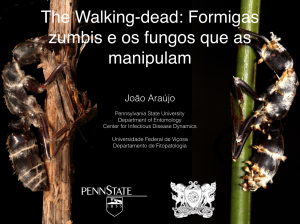Speaker: João Araújo (28/11/2017, às 16:00 horas), Pennsylvania State University. Myrmecophilous Ophiocordyceps – including the so-called zombie-ant fungi – comprise one of the most intriguing and fascinating relationships between microbes and animals. They are widespread within tropical forests worldwide, with relatively few reports from temperate ecosystems. Most of these pathogens possess the ability to manipulate host behavior in order to increase their own fitness. Depending on the fungal species involved the infected ants are manipulated either to leave the nest and ascend understory shrubs, to die biting onto vegetation, or descend from the canopy to die at the base of trees. Experimental evidence has demonstrated that the behavioral change aids spore dispersal and thus increases the chances of infection, due to the existing behavioral immunity expressed inside ant colonies that limits fungal development and transmission. There are two major groups of myrmecophilous Ophiocordyceps, the hirsutelloid and the hymenostilboid species, which comprises two distinct evolutionary lineages. Although belonging to the same genus, these two lineages exhibit totally different morphologies, host association and strategies to transmit their spores. Despite their undoubted importance for ecosystem functioning, these fungal pathogens are still poorly documented, especially regarding their diversity, ecology and evolutionary relationships. In this talk, I will present the most recent discoveries regarding this charismatic group of Fungi.
Data e Hora: 28/11/2017 às 16:00 horas
Local: Auditório do ESB

